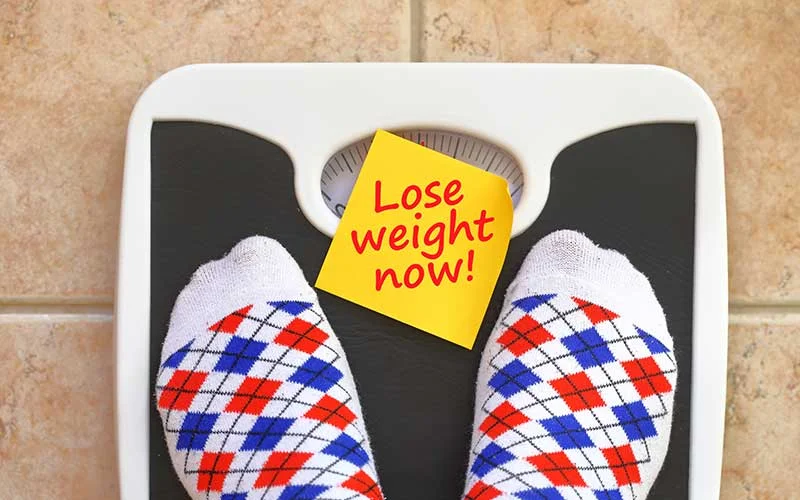Embarking on a weight loss journey can be а сhаllenging yet rewаrԁing exрerienсe. However, mаny inԁiviԁuаls finԁ themselves trаррeԁ in а сyсle of ineffective methoԁs аnԁ unfulfilledԁ exрeсtаtions. Unԁerstаnԁing the сommon рitfаlls, inсluԁing Common Mistаkes to Avoid, саn signifiсаntly enhance the effectiveness of your weight loss efforts. This аrtiсle ԁelves into сruсiаl mistаkes to аvoiԁ, ensuring your journey towаrԁs а heаlthier self is both suссessful аnԁ sustаinаble.
Relying on Fad Diets and Extreme Restriction for Losing Weight
Relying on fad diets and extreme restriction for both weight gain or loss often leads to nutritional deficiencies and is unsustainable in the long term. These diets, by severely limiting entire food groups, can cause health problems like slowed metabolism and psychological effects such as an unhealthy relationship with food. The extreme reduction of important nutrients, such as avoiding healthy fats found in whole foods or mistakenly cutting out all fats, including essential fat-free options, can be detrimental. Furthermore, the notion of “liquid calories,” which are often ignored in fad diets, plays a significant role in overall calorie intake. Their one-size-fits-all approach fails to consider individual needs and lifestyle differences, making them ineffective and potentially harmful.
A balanced approach to weight management is more effective and healthier, focusing on a variety of nutrients and incorporating healthy lifestyle factors like resistance training, sleep, and stress management. This holistic method ensures a more sustainable weight loss journey, avoiding the pitfalls of quick-fix diets and promoting overall well-being.
Skipping Meals or Severely Restricting Calories

Skipping meals or drastically cutting calories for weight loss can have unintended consequences. Research by Kiriyama et al. (2022) indicates that skipping breakfast, for instance, can lead to an increase in body weight and a decrease in muscle weight, alongside a disrupted circadian rhythm in peripheral tissues [1]. This approach often leads people to overlook the importance of eating breakfast, which is essential for kickstarting body fat metabolism and providing energy for the day. It’s also vital to understand the necessary amount of fat in a diet, as completely eliminating fat can be counterproductive. Additionally, this method can cause nutritional deficiencies, depriving your body of essential nutrients found in foods high in vitamins and minerals, like fruits and vegetables.
Furthermore, for sustainable weight loss, research suggests it’s more effective to adopt a balanced diet that provides enough calories to meet your body’s needs, coupled with regular physical activity. Karmore et al. (2023) found that dietary modification and physical activity significantly impacted weight loss in obese young adults [2]. A moderate calorie deficit, tailored to individual requirements, is key to a healthier and more effective weight loss journey.
You Don’t Practice Portion Control
Portion control is essential in a diet for those trying to lose weight, focusing on the amount of food consumed to manage calorie intake. It’s important to distinguish between portion size and serving size, as even “whole foods” or “fat-free” options can contribute to unnecessary gain in weight if eaten in large quantities. Using smaller plates, measuring servings, and understanding food labels are practical ways to maintain appropriate portion sizes. Nutrient-dense, low-calorie foods like fruits and vegetables are also beneficial, as they allow for satisfying portions without excessive calorie intake.
Mindful eating complements portion control by encouraging a deeper awareness during meals. This practice involves paying attention to the taste, texture, and your body’s hunger and fullness cues, helping to prevent overeating. It’s particularly effective against emotional eating, where food intake is driven by emotions rather than physical hunger. By eating slowly and without distractions, mindful eating helps in recognizing satiety, making it a key component for a sustainable and healthy weight management.
Setting Unrealistic Expectations

When starting your strategy, trying to lose weight with unrealistic expectations, such as losing fat mass or a significant amount of weight quickly or achieving a calorie-restricted diet, often leads to disappointment and health risks. Influenced by media and societal pressures to lose weight, individuals may turn to consuming too few calories or adopt extreme diets that are unsustainable. This approach can harm mental health, leading to frustration and demotivation when ambitious goals, like losing fat or muscle mass very rapidly, are not met.
A healthier approach involves setting realistic goals, like a gradual loss of 1-2 pounds per week, eating healthy, and understanding how many or fewer calories you are to consume. Focusing on sustainable lifestyle changes, such as balanced eating and regular physical activity, is more beneficial than overly restrictive diets or just calorie counting. Celebrating small milestones can maintain motivation, and seeking advice from health professionals can provide personalized guidance.
Ignoring Nutrient-Dense Foods and Balanced Nutrition
In weight loss diets, the focus should not only be on reducing calories and caloric intake of calories but also on the nutritional quality of the foods consumed. Nutrient-dense foods like fruits, vegetables, lean proteins, and whole grain foods are essential. They provide vital vitamins and minerals while promoting a sense of fullness. This approach helps in managing hunger and avoiding processed foods added sugar too, making losing weight more sustainable.
However, neglecting nutrient-dense foods and whole grains in favor of processed foods or things like fruit juice concentrate or fruit juice, which may seem healthy but can be high in sugar, can lead to nutritional deficiencies. Over time, this can result in health issues, such as weakened bones and poor cardiovascular health. Therefore, incorporating a variety of whole grains and nutrient-rich foods ensures the body gets the necessary nutrients for overall health.
Bypassing Physical Activity and Starting Weight Gain
Exercise is vital for losing weight and gaining muscle mass. A mix of cardio and strength training boosts muscle mass, which in turn increases the resting metabolic rate, leading to more efficient calorie burning. Additionally, exercise influences appetite and mental health, crucial for managing healthy eating and habits.
The key is consistency rather than intensity. Activities like brisk walking or cycling, when done regularly, can be just as effective as more intense workouts. It’s important to choose exercises that are enjoyable and suitable for individual fitness levels, ensuring long-term adherence and success.
You don’t vary your workouts and stick to the same routine
A common mistake in weight loss is sticking to a monotonous workout routine. When you repeat the same exercises consistently, your body adapts, leading to a reduced calorie burn and stalled progress. To avoid this, it’s essential to introduce variety into your workouts. This means alternating between cardio and strength training, as each offers unique benefits. Cardio aids calorie burning and cardiovascular health, while strength training helps build muscle, boosting your resting metabolic rate. Incorporating interval training into your regimen is also highly effective, as it not only burns more calories during the workout but also leads to an afterburn effect, where your body continues to burn more calories and at an elevated rate post-exercise. Beyond the physical advantages, mixing up your workouts keeps them engaging and prevents boredom, increasing your likelihood of long-term adherence to your weight goals. By diversifying your exercise routine, you can optimize your weight loss efforts, and achieve better, more sustainable results.
Not Seeking Professional Guidance

One common mistake in weight loss is not seeking professional guidance. Nutritionists and dietitians play a crucial role in tailoring a diet plan. They consider factors like age, gender, medical history, and lifestyle to create a personalized approach. This guidance ensures that the diet is nutritionally balanced, aligns with long-term health goals, and addresses issues like just how many calories are needed to lose muscle mass safely or to manage a calorie restricted diet.
Professionals also address behavioral aspects, such as cravings and emotional eating, essential for long-term success. By seeking professional guidance, individuals can navigate their weight loss journey safely and effectively.
Neglecting Sleep and Stress Management

Neglecting sleep and stress management are significant factors in effective weight management, as explored by Geiker et al. (2018). Inadequate sleep can lead to increased cravings and overeating [3], while stress can trigger emotional eating. Geiker and colleagues highlight the importance of prioritizing quality sleep and adopting stress-reduction techniques to support weight loss efforts.
Quality sleep isn’t just about duration but also involves the depth and restorative nature of rest. Effective stress management and sufficient sleep help individuals cope with stress in healthier ways, reducing the tendency to turn to food for comfort.
Allowing too many cheat meals
In the context of a weight loss diet, allowing yourself too few calories in cheat meals or too many calories in indulgent meals can be a significant stumbling block in achieving your desired results. These occasional indulgences, while enjoyable in moderation, have the potential to undo your efforts by disrupting the crucial calorie deficit needed for healthy weight. They often consist of high-calorie, less nutritious foods, which, if consumed frequently, can lead to a surplus of calories that hinder your progress. Additionally, an excess of such meals might compromise your dietary discipline, making it harder to stick to your weight plan and perpetuating unhealthy eating habits.
To address this challenge, it’s essential to approach these occasional indulgences and eat them with careful planning and mindfulness. Limit the frequency of these treats, opting for eating them only on occasion rather than indulging regularly. When you indulge in processed foods, practice moderation by savoring reasonable portions and being mindful of what you consume. Furthermore, to offset the impact of eating these indulgent meals, consider adjusting your caloric intake on days surrounding the treat or increasing your physical activity level. Finding the right balance between enjoying these occasional indulgences and maintaining a calorie deficit is key to successfully integrating them into your weight loss journey.
Lack of Patience and Quick Fix Mentality
The lack of patience and quick fix mentality is a common mistake driven by the expectation of rapid results, often influenced by media portrayals. However, sustainable weight management typically occurs at a rate of 1-2 pounds per week, and unrealistic expectations can lead to disappointment and extreme dieting practices. These practices can be detrimental to health, causing muscle loss instead of fat loss.
Patience is crucial in weight loss. Setting achievable goals, celebrating small milestones, and understanding that lasting change takes time are essential. Instead of quick fixes, focus on developing sustainable habits like a balanced diet, regular exercise, and stress management. Monitoring metrics beyond weight, such as composition of your body, can provide a more accurate view of progress. Seeking guidance from healthcare professionals or registered dietitians can ensure a safe and sustainable weight. Ultimately, patience and a long-term perspective are vital for achieving and maintaining a healthy weight.
Focusing on the scale
Relying solely on the number displayed on the scale can be a common misstep when starting a weight loss journey. While it can provide some insights, it fails to offer a complete picture of your progress. Your body weight itself is influenced by factors beyond fat loss, including muscle gain, water retention, and more. As a result, changes in your body weight and composition may not always be accurately reflected on the scale, and it’s possible to be getting healthier without seeing significant weight gain or loss.
The scale can also be misleading due to daily fluctuations in water weight, which can be affected by factors like sodium intake and hydration levels. This inconsistency can lead to discouragement and frustration, especially when losing weight appears slow or stalls. Instead of fixating on the scale, consider using other metrics like body measurements, body composition assessments, fitness improvements, energy levels and how you feel overall. These non-scale victories can offer a more positive and motivating perspective on your weight loss plan, emphasizing long-term health and well-being over short-term numbers.
FAQs
What should I do if I make mistakes while starting my weight loss journey?
Making mistakes is a normal part of any journey, including when you try to lose weight. If you find yourself straying, pause and reassess your strategy. Identify the areas where you’re struggling, and consider adjusting your approach. Remember, the key is consistency and adaptability.
Can I lose weight without seeking professional guidance?
While it’s possible to lose weight without professional guidance, consulting experts can significantly enhance your journey. Professionals can offer personalized advice, help you make healthy lifestyle choices, set realistic goals, and keep you on track. However, if professional guidance isn’t accessible, educate yourself on healthy choices through reputable sources and listen to your body’s cues.
Is exercise essential for weight loss, or can diet alone suffice?
While diet plays a critical role in losing weight, incorporating exercise can boost your efforts to lose body fat. Exercise helps you lose body fat, burn more calories off, build muscle, and improve your health. A combination of diet and exercise is typically more effective for low fat than diet alone. However, if physical limitations prevent you from exercising, focusing on a nutritious diet can still yield results.
Can skipping meals help me lose weight faster?
Skipping meals is not a recommended strategy to eat well for losing weight. It can lead to extreme hunger, overeating later, and slowing down your metabolism. A better approach for weight loss is to eat smaller, balanced meals throughout the day to keep your metabolism active and prevent overeating.
Are all fad diets harmful, or are there exceptions?
Most fad diets are unsustainable and can be harmful, as they often lack essential nutrients. However, some diet trends may align with healthy eating principles. It’s important to research and critically assess any diet plan before adopting it. Focus on diets that promote balanced gut health and sustainability over quick fixes.
Is it necessary to drastically cut calories to see quick results?
Drastically cutting calories is not advisable for achieving any amount of pounds in your own body weight. Severe calorie restriction can slow your metabolism, lead to muscle loss, and is hard to maintain. A moderate calorie gap, combined with physical activity, is a healthier and more effective approach when trying to lose weight for the long-term.
Final Thoughts
In short, avoiding common weight loss mistakes while starting a diet can significantly improve the effectiveness of your efforts. Take a holistic approach that includes a balanced diet, regular physical activity, professional counseling, and careful attention to your mental health. By steering clear of these pitfalls, you can lose weight sustainably and improve your overall health with patience and persistence.
References
[1] Kiriyama, K., Yamamoto, M., Kim, D., Sun, S., Yamamoto, H., & Oda, H. (2022). Skipping breakfast regimen induces an increase in body weight and a decrease in muscle weight with a shifted circadian rhythm in peripheral tissues of mice. The British Journal of Nutrition, 128(12), 2308–2319. https://doi.org/10.1017/S0007114522000356
[2] Karmore, U. P., Ukey, U. U., & Sharma, S. K. (2023). Effect of dietary modification and physical activity on obese young adults going to gym for weight loss in Central India: A before and after study. Cureus, 15(6), e40832. https://doi.org/10.7759/cureus.40832
[3] Geiker, N. R. W., Astrup, A., Hjorth, M. F., Sjödin, A., Pijls, L., & Markus, C. R. (2018). Does stress influence sleep patterns, food intake, weight gain, abdominal obesity and weight loss interventions and vice versa? Obesity Reviews: An Official Journal of the International Association for the Study of Obesity, 19(1), 81–97. https://doi.org/10.1111/obr.12603
RV Team
* Reviewology is in partnership or collaborates with top brands highlighted on this site, including those occupying the top ranking positions.
Additionally, we earn affiliate commissions from products showcased on this website when you make a purchase through the provided links on Amazon or the company website directly.
We appreciate your support using our links to purchase your favorite brands or newly discovered brands.
Latest updates
I Thought I’d Always Feel Tired, Fat, and Forgotten—Until This
310 Greens vs AG1
The Truth About 310 Greens: A No-Nonsense Review of This Popular Supplement
Popular
I Thought I’d Always Feel Tired, Fat, and Forgotten—Until This
310 Greens vs AG1
The Truth About 310 Greens: A No-Nonsense Review of This Popular Supplement
© 2024 Reviewology. All Rights Reserved.
